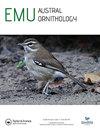Insular nestling growth and its relationship to parental care effort in Silvereyes, Zosterops lateralis
IF 1.1
4区 生物学
Q3 ORNITHOLOGY
引用次数: 0
Abstract
ABSTRACT The rate at which avian offspring grow can have consequences for survival and reproductive output as an adult and is known to vary widely among and within species. This variation is thought to be an adaptive response to cope with environmental variation. The principal environmental factors affecting growth are food availability and predation risk, predominantly acting as constraints on parental care. Islands pose an interesting system to explore growth rate dynamics, because the characteristic insular features of high population densities and depauperate predator diversity translate into a potentially food limited environment with low predation risk. Insular environments typically produce populations with slower life history strategies and larger body size in small-bodied species, features that are likely to be mediated by growth rate. We describe the nestling growth of an insular population of Silvereyes and how it relates to parental size and parental care. Neither parental size nor parental care explained insular nestling growth rate, even though food acquisition is thought to underpin avian growth rates. This could be due to a mismatch between acquisition and allocation of resources by nestlings. Compared to a small number of mainland nestlings, the island growth curve asymptotes were significantly larger and inflection points much later, but insular growth rates were only marginally slower. This is in line with proposed insular adaptations required to produce larger body size on islands, however understanding the mechanism underlying this pattern will require data on the relationship between food quality and acquisition, and physiological allocation of resources within individuals.银眼斑鳖岛巢生长及其与亲代抚育努力的关系
鸟类后代的生长速度会对成虫的生存和繁殖产出产生影响,并且在物种之间和物种内部差异很大。这种变化被认为是应对环境变化的适应性反应。影响生长的主要环境因素是食物供应和捕食风险,主要是对亲代养育的限制。岛屿提供了一个有趣的系统来探索生长速率动态,因为高种群密度和捕食者多样性不足的岛屿特征转化为潜在的食物有限的环境,具有低捕食风险。岛屿环境通常会产生具有较慢生活史策略和较小体型物种较大体型的种群,这些特征可能是由生长速度调节的。我们描述了银眼岛种群的雏鸟生长,以及它与亲代大小和亲代护理的关系。尽管食物获取被认为是鸟类生长速度的基础,但父母的体型和父母的照顾都不能解释岛巢雏鸟的生长速度。这可能是由于雏鸟获取和分配资源之间的不匹配。与少数大陆雏鸟相比,海岛雏鸟的生长曲线渐近线明显较大,拐点明显较晚,但海岛雏鸟的生长速度仅略慢。这与在岛屿上产生更大体型所需的岛屿适应一致,然而,了解这种模式背后的机制将需要关于食物质量和获取之间关系的数据,以及个体内部资源的生理分配。
本文章由计算机程序翻译,如有差异,请以英文原文为准。
求助全文
约1分钟内获得全文
求助全文
来源期刊

Emu-Austral Ornithology
生物-鸟类学
CiteScore
2.00
自引率
7.70%
发文量
33
审稿时长
>12 weeks
期刊介绍:
Emu – Austral Ornithology is the premier journal for ornithological research and reviews related to the Southern Hemisphere and adjacent tropics. The journal has a long and proud tradition of publishing articles on many aspects of the biology of birds, particularly their conservation and management.
 求助内容:
求助内容: 应助结果提醒方式:
应助结果提醒方式:


